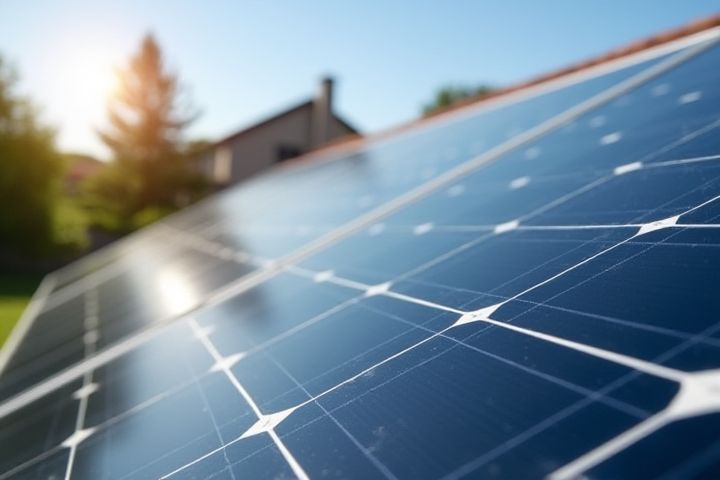
Adding solar panels to your house significantly reduces energy costs by harnessing renewable solar energy. These panels convert sunlight into electricity, providing a sustainable power source that decreases reliance on fossil fuels. In many regions, installing solar panels can increase property value and appeal to eco-conscious buyers. Financial incentives, such as tax credits and rebates, often accompany solar panel installations, further enhancing their cost-effectiveness. Moreover, utilizing solar energy contributes to lower carbon emissions, promoting a healthier environment for future generations.
Why Add Solar Panels To A House
Reduces electricity bills
Installing solar panels on your house significantly reduces electricity bills by harnessing sunlight to generate clean energy. As you produce your own electricity, reliance on the grid decreases, leading to lower utility costs and potential savings over time. Many homeowners experience substantial reductions in monthly energy expenses, particularly in regions with high electricity rates or abundant sunshine. Furthermore, surplus energy generated can often be sold back to the grid, providing additional financial benefits and enhancing the return on your solar panel investment.
Increases energy independence
Adding solar panels to your house significantly enhances energy independence by allowing you to generate your own electricity from a renewable source. With solar energy, you can reduce reliance on the grid and fossil fuels, which fluctuates in price and availability. Furthermore, utilizing solar power decreases your vulnerability to energy shortages and rising utility costs, contributing to long-term financial stability. Investing in solar technology not only promotes environmental sustainability but also empowers you to take control of your energy consumption.
Environmentally friendly
Adding solar panels to your house significantly reduces your carbon footprint, as they harness renewable energy from the sun, a clean and abundant resource. These panels convert sunlight into electricity, thereby decreasing reliance on fossil fuels, which contribute to greenhouse gas emissions and climate change. By integrating solar technology, you not only lower your utility bills but also promote sustainable energy practices that benefit the environment. Choosing solar energy supports biodiversity conservation and leads to a healthier planet for future generations.
Boosts property value
Installing solar panels significantly boosts property value, appealing to environmentally conscious buyers and those seeking long-term savings. Homeowners benefit from reduced energy bills and potential tax incentives, enhancing the financial attractiveness of their property. Solar energy installations often lead to quicker home sales, with studies showing homes equipped with solar panels sell for a premium compared to traditional homes. By investing in solar technology, you not only contribute to a sustainable future but also increase your home's market presence and investment potential.
Provides energy security
Installing solar panels on your house enhances energy security by generating a reliable and renewable energy source. This independence reduces reliance on traditional grid systems, which can be prone to outages and fluctuating energy prices. By harnessing solar power, you can effectively mitigate risks associated with energy supply disruptions, ensuring a consistent power flow for essential appliances and systems. Moreover, solar energy contributes to a sustainable lifestyle, decreasing your carbon footprint while securing your home's energy future.
Lowers carbon footprint
Installing solar panels on your house significantly lowers your carbon footprint by harnessing renewable energy from the sun. Each kilowatt-hour generated by solar panels reduces dependence on fossil fuels, which are responsible for approximately 67% of CO2 emissions in the United States. By switching to solar energy, you can potentially offset several tons of carbon emissions annually, contributing to a cleaner environment. In fact, a typical residential solar system can reduce greenhouse gas emissions by about 3 to 4 tons per year.
Available tax incentives
Adding solar panels to your house not only contributes to renewable energy but also opens the door to various tax incentives that can significantly reduce installation costs. The federal solar investment tax credit (ITC) allows you to deduct a percentage of your solar system's cost from your federal taxes, offering a substantial financial benefit. Additionally, many states provide their own incentives, such as rebates or property tax exemptions, which can further enhance your return on investment. By investing in solar energy, you not only lower your utility bills but also take advantage of these economic advantages, making it a financially savvy choice.
Minimal maintenance required
Solar panels require minimal maintenance, making them an attractive option for homeowners. Typically, you might only need to clean them once or twice a year to remove dust and debris, ensuring efficiency remains optimal. With no moving parts, these systems can operate for 25 years or more with little intervention needed. Regular inspections can further enhance longevity, but the overall upkeep is significantly lower compared to traditional energy systems.
Supports renewable energy growth
Installing solar panels in your home significantly supports renewable energy growth by harnessing sunlight to generate electricity. With approximately 200,000 megawatts of solar capacity installed in the United States alone, this innovation plays a crucial role in decreasing dependency on fossil fuels. Each kilowatt-hour of solar power produced reduces carbon emissions, contributing to a cleaner environment and combating climate change. By embracing solar technology, homeowners not only cut energy costs but also join a global movement towards sustainable energy solutions.
Long-term cost savings
Installing solar panels can lead to significant long-term cost savings, often reducing energy bills by 50% or more. Over 25 years, the average household can save anywhere from $10,000 to $30,000, depending on energy consumption and local electricity rates. With tax incentives, rebates, and a growing number of financing options, the initial investment becomes increasingly affordable. You can also increase your home's value, with properties equipped with solar panels often selling for an average of 4.1% more than those without.
